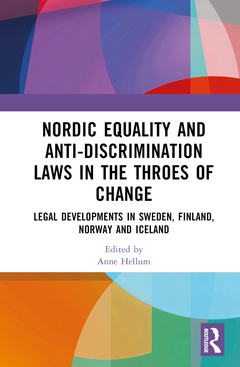Description
Nordic Equality and Anti-Discrimination Laws in the Throes of Change
Legal developments in Sweden, Finland, Norway, and Iceland
Coordinators: Hellum Anne, Ikdahl Ingunn, Strand Vibeke, Svensson Eva-Maria
Language: English
Subjects for Nordic Equality and Anti-Discrimination Laws in the...:
Keywords
Nordic Equality; Anti-Discrimination Laws; Legal developments in Sweden; World Economic Forum; Gender Gap Index; Gender Equality; CEDAW Convention; CEDAW Committee; EU Law; Intersectional Discrimination; EEA Law; Anti-discrimination Law; Gender Equality Policy; Nordic Gender Equality; Gender Equality Act; EFTA Court; Gender Equality Legislation; Indirect Gender Discrimination; Istanbul Convention; Equality Ombudsman; Norwegian Gender Equality; Swedish Gender Equality Policy; Clinical Engineer; Swedish Gender Equality; Substantive Gender Equality; Discrimination Grounds; Gender Equality Project; Social Democratic Alliance; Gender Pay Gap; Legislative Bill
· 15.6x23.4 cm · Hardback
Description
/li>Contents
/li>Readership
/li>Biography
/li>
The Nordic states were among the first in the world to enact general gender equality and anti-discrimination laws with low threshold enforcement mechanisms. Today, the Nordic countries top the World Economic Forum?s Gender Gap Index ?but they have still not succeeded in closing the gender gap. This book draws a diverse and complex picture of the long, uneven, and unfinished process towards substantive equality in four Nordic countries: Sweden, Finland, Norway, and Iceland. It presents the Nordic gender equality model?s systematic use of three measures: overarching gender policies, legislation that has an explicit or implicit impact on gender relations, and gender equality and anti-discrimination laws with low-threshold enforcement systems. What potentials and limitations do the Nordic gender equality and anti-discrimination law regimes have to combat individual discrimination and structural inequality? Can these regimes function as a driver of political, legal, economic, cultural, and social change and as a corrective to laws, policies, and practices that uphold existing inequalities and, if so, to what extent? Can weaknesses in the equality and anti-discrimination laws and the way they are enforced hamper efforts to close remaining gender gaps? Rather than looking at the Nordic gender equality laws and policies in isolation, the book situates their development and transformative potential within a changing European and international political and legal landscape.
Preface
Notes on contributors
Introduction: Nordic gender equality and anti-discrimination laws in the throes of change
ANNE HELLUM, INGUNN IKDAHL, VIBEKE BLAKER STRAND, ÅSA GUNNARSSON, AND EVA-MARIA SVENSSON
1 Sweden: From proactive policies to anti-discrimination law
ÅSA GUNNARSSON, LENA SVENAEUS, AND EVA-MARIA SVENSSON
2 Paradoxes in Finnish gender equality law and policies
KEVÄT NOUSIAINEN
3 Between norms and institutions: Unlocking the transformative potential of Norwegian equality and anti-discrimination law
ANNE HELLUM, INGUNN IKDAHL, AND VIBEKE BLAKER STRAND
4 The potential of Icelandic gender equality legislation
BRYNHILDUR G. FLÓVENZ
Index
Anne Hellum is professor emerita at the Department of Public and International Law within the Faculty of Law of the University of Oslo, Norway. She was the director of the Institute of Women’s Law, Child Law, Equality, and Anti-Discrimination Law from 2000 to 2023 and the director of the faculty research group Rights, Individuals, Culture, and Society (RICS) from 2006 to 2016. She teaches courses on women’s human rights in context, national and international equality and anti-discrimination law, and legal anthropology. Her main research interests lie in how law responds to intersecting identities such as gender, ethnicity, religion, sexual orientation, and gender identity and the plurality of intersecting international, national, and local norms. She has published a series of books, articles, and book chapters on these topics. She is the co-editor (with Henriette Sinding Aasen) of Women’s Human Rights: CEDAW in International, Regional and National Law (Cambridge University Press 2013), the editor of Human Rights, Sexual Orientation and Gender Identity (Routledge 2017), and the co-author (with Vibeke Blaker Strand) of the textbook Likestillings- og diskrimineringsrett [Equality and Anti-Discrimination Law] (Gyldendal 2022).
Ingunn Ikdahl is a professor at the Department of Public and International Law within the Faculty of Law of the University of Oslo, Norway. She chaired the faculty’s research group Welfare, Rights and Discrimination (VERDI) in 2017–022. Ikdahl has worked on women’s law, non-discrimination, and rights to property and natural resources in sub-Saharan Africa. Currently, she is involved in research projects examining different dimensions of the Norwegian welfare state, including digitalization of the welfare state, welfare and rights after the 22 July terror attack, health rights and health services in prison, and the role of EEA law in Norwegian welfare administration. Her interest in g




